初二上学期英语知识点汇总修订稿
八年级上册英语知识点归纳整理
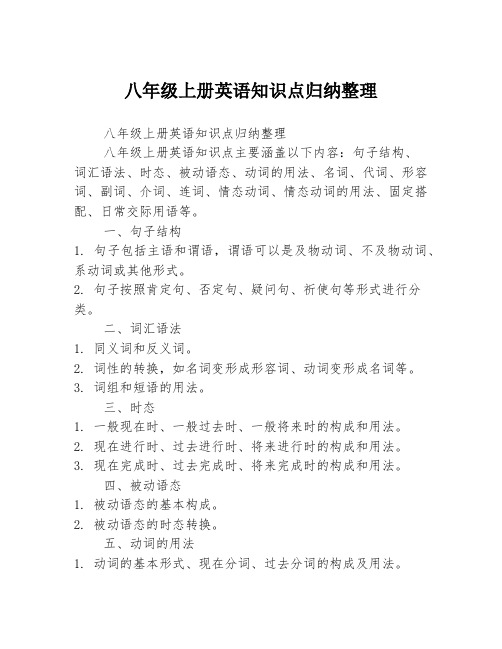
八年级上册英语知识点归纳整理八年级上册英语知识点归纳整理八年级上册英语知识点主要涵盖以下内容:句子结构、词汇语法、时态、被动语态、动词的用法、名词、代词、形容词、副词、介词、连词、情态动词、情态动词的用法、固定搭配、日常交际用语等。
一、句子结构1. 句子包括主语和谓语,谓语可以是及物动词、不及物动词、系动词或其他形式。
2. 句子按照肯定句、否定句、疑问句、祈使句等形式进行分类。
二、词汇语法1. 同义词和反义词。
2. 词性的转换,如名词变形成形容词、动词变形成名词等。
3. 词组和短语的用法。
三、时态1. 一般现在时、一般过去时、一般将来时的构成和用法。
2. 现在进行时、过去进行时、将来进行时的构成和用法。
3. 现在完成时、过去完成时、将来完成时的构成和用法。
四、被动语态1. 被动语态的基本构成。
2. 被动语态的时态转换。
五、动词的用法1. 动词的基本形式、现在分词、过去分词的构成及用法。
2. 动词的逻辑主语和关系代词。
六、名词1. 单数名词和复数名词的区别,复数名词的构成规则。
2. 可数名词和不可数名词的区别。
七、代词1. 人称代词、物主代词、反身代词的用法。
2. 指示代词、不定代词的用法。
八、形容词1. 形容词的一般用法。
2. 最高级和比较级形容词的构成和用法。
九、副词1. 副词的一般用法。
2. 最高级和比较级副词的构成和用法。
十、介词1. 常见的介词及其用法。
十一、连词1. 常见的连词及其用法。
十二、情态动词1. can、could、may、might、shall、should、will、would、must、need等情态动词的用法。
十三、情态动词的用法1. 表示能力、可能性、许可、请求、建议、必须等。
2. 情态动词表将来时态的用法。
十四、固定搭配1. 常见的固定搭配及其用法。
十五、日常交际用语1. 日常交际中常用的问候语、道歉、表示感谢等用语。
以上为八年级上册英语知识点的归纳整理,涵盖了语法、词汇、句型、语用等多个方面的内容。
八年级上册英语知识点归纳总结道客巴巴
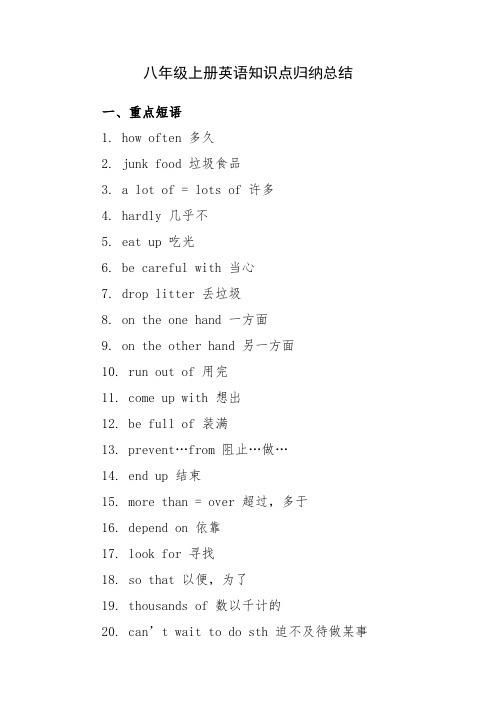
八年级上册英语知识点归纳总结一、重点短语1. how often 多久2. junk food 垃圾食品3. a lot of = lots of 许多4. hardly 几乎不5. eat up 吃光6. be careful with 当心7. drop litter 丢垃圾8. on the one hand 一方面9. on the other hand 另一方面10. run out of 用完11. come up with 想出12. be full of 装满13. prevent…from 阻止…做…14. end up 结束15. more than = over 超过,多于16. depend on 依靠17. look for 寻找18. so that 以便,为了19. thousands of 数以千计的20. can’t wait to do sth 迫不及待做某事21. around the world 在全世界22. in different ways 以不同的方式23. as we know 正如我们所知24. make a difference 有所作为25. become successful 取得成功26. seem impossible 似乎不可能27. give up easily 轻易放弃二、重点句型1. It’s +形容词+ to do sth. 干某事是……的。
2. It takes sb some time to do sth. 花某人多长时间干某事。
3. How do you keep healthy?你怎么保持健康?4. Here’s an idea!我有个主意!5. I really enjoy the time when I’m with you. 我真的很喜欢和你在一起的时光。
6. is it possible to do sth?干某事可能吗?7. It’s important to do sth. 干某事是重要的。
英语八年级上册重点知识归纳
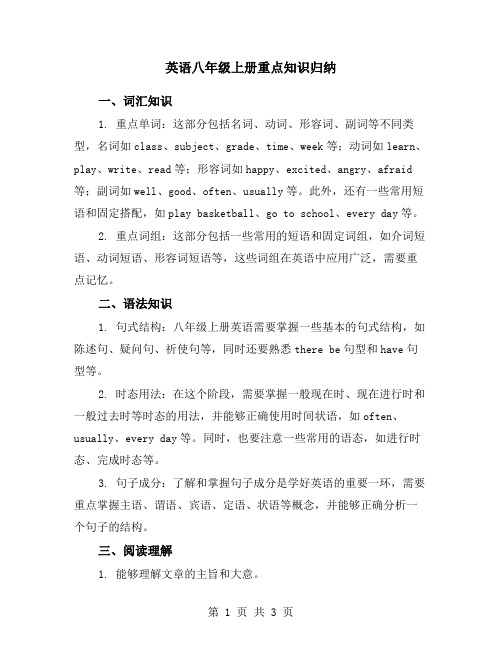
英语八年级上册重点知识归纳一、词汇知识1. 重点单词:这部分包括名词、动词、形容词、副词等不同类型,名词如class、subject、grade、time、week等;动词如learn、play、write、read等;形容词如happy、excited、angry、afraid 等;副词如well、good、often、usually等。
此外,还有一些常用短语和固定搭配,如play basketball、go to school、every day等。
2. 重点词组:这部分包括一些常用的短语和固定词组,如介词短语、动词短语、形容词短语等,这些词组在英语中应用广泛,需要重点记忆。
二、语法知识1. 句式结构:八年级上册英语需要掌握一些基本的句式结构,如陈述句、疑问句、祈使句等,同时还要熟悉there be句型和have句型等。
2. 时态用法:在这个阶段,需要掌握一般现在时、现在进行时和一般过去时等时态的用法,并能够正确使用时间状语,如often、usually、every day等。
同时,也要注意一些常用的语态,如进行时态、完成时态等。
3. 句子成分:了解和掌握句子成分是学好英语的重要一环,需要重点掌握主语、谓语、宾语、定语、状语等概念,并能够正确分析一个句子的结构。
三、阅读理解1. 能够理解文章的主旨和大意。
2. 能够理解文章的细节和事实。
3. 能够根据上下文猜测生词的意思。
4. 能够理解作者的观点和态度。
5. 不断提高阅读速度和理解能力。
四、写作知识1. 写作技巧:掌握一些基本的写作技巧,如正确的语法、拼写和标点符号,以及正确的文章结构等。
2. 写作实践:通过不断的写作练习,提高自己的写作能力。
除此之外,八年级上册英语还需要注意以下几个方面:1. 听力训练:每天坚持进行听力训练,提高听力理解能力。
2. 口语表达:鼓励学生多进行口语练习,提高口语表达能力。
在口语表达中要注意语音、语调和语速等方面的问题,同时也要注意表达的准确性和得体性。
英语八年级上册1~3单元知识点

英语八年级上册1~3单元知识点一、单元一:Hello !1. 问候和自我介绍1.1 问候语在日常交流中,问候是非常基础而且重要的部分,例如:Hello!Hi!Good morning/afternoon/evening!1.2 自我介绍当你第一次见到某人时,你需要用英语介绍自己,包括自己的尊称、芳龄、爱好等信息。
例如: My name is Tom. I'm 14 years old. Ilike playing basketball and listening to music.2. 询问及回答2.1 询问对方的尊称和芳龄询问对方的尊称和芳龄是交流中的基本内容,例如:What's your name? How old are you?2.2 回答询问当他人询问你尊称和芳龄时,你需要会做简单而又礼貌的回答,例如:My name is Lily. I'm 13 years old.3. 介绍自己的朋友3.1 描述外貌在介绍朋友时,需要用英语描述对方的外貌特征,例如:He has short black h本人r and big blue eyes.3.2 描述性格和爱好介绍朋友的性格及爱好也是非常重要的部分,例如:She is outgoing and she likes singing and dancing.二、单元二:My Day1. 时间表及日常活动1.1 表述时间在日常生活中,我们需要学会用英语表达时间,例如:It's seven o'clock. It's time for breakfast.1.2 描述日常活动描述日常活动是非常重要的,通过用英语描述,可以让对方更好地了解你的生活,例如:I get up at six thirty in the morning.2. 描述一天的安排2.1 早上在英语中,描述早上的活动需要用适当的词汇和句子结构,例如:In the morning, I usually have breakfast at seven o'clock.2.2 中午描述中午的安排也需要合适的表述方式,例如:At noon, I have lunch with my classmates.2.3 下午形容下午的活动也需要用英语来描述,例如:In the afternoon, I play basketball with my friends after school.3. 时间状语及延续性动词3.1 时间状语在描述一天的安排时,时间状语能让你的描述更加清晰和连贯,例如:At eight in the evening, I do my homework.3.2 延续性动词在描述日常活动时,延续性动词的使用极为重要,能够更准确地表达你的日常习惯,例如:I'm reading a book at the moment.三、单元三:At Home1. 家庭成员及家庭关系1.1 家庭成员描述家庭成员时,需要用英语进行表述,例如:My mother is a teacher and my father is a doctor.1.2 家庭关系通过用英语描述家庭成员之间的关系,能够更好地展现出你的家庭情况,例如:My parents are very kind to me and my sister.2. 描述家中的布置2.1 房间及家具通过用英语描述家中的布置,能够让对方更好地了解你的家庭环境,例如:There is a bed, a desk and a ch本人r in my room.2.2 家居摆设描述家居摆设也是非常关键,通过合适的表述,可以给对方留下深刻的印象,例如:There are some photos on the wall and some plants on the table.3. 家庭活动及家务3.1 家庭活动描述家庭活动时需要用英语进行表述,例如:We often watch TV together on weekends.3.2 家务描述家务活动同样需要用合适的方式表述,例如:I help my mom with the cooking every evening.以上是英语八年级上册1~3单元的部分知识点,希望同学们能够认真学习,掌握这些知识,提高英语的表达能力。
八年级上册知识点汇总英语
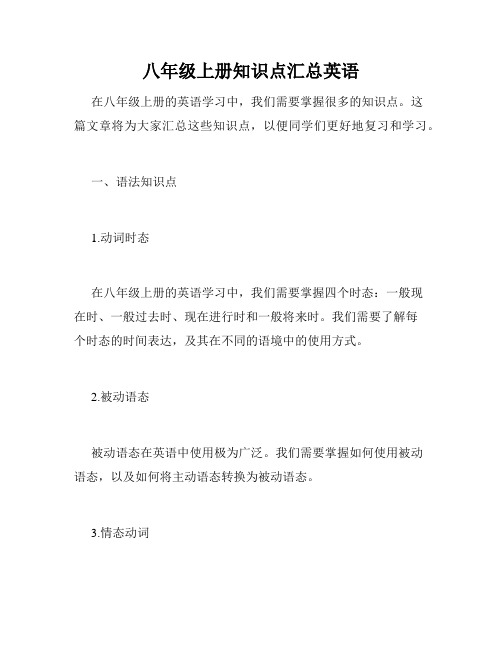
八年级上册知识点汇总英语在八年级上册的英语学习中,我们需要掌握很多的知识点。
这篇文章将为大家汇总这些知识点,以便同学们更好地复习和学习。
一、语法知识点1.动词时态在八年级上册的英语学习中,我们需要掌握四个时态:一般现在时、一般过去时、现在进行时和一般将来时。
我们需要了解每个时态的时间表达,及其在不同的语境中的使用方式。
2.被动语态被动语态在英语中使用极为广泛。
我们需要掌握如何使用被动语态,以及如何将主动语态转换为被动语态。
3.情态动词情态动词是一种特殊的动词形式,包括can、could、may、might、must、shall、should、will和would等。
我们需要了解每个情态动词的意义和用法。
4.虚拟语气虚拟语气用于表达可能的假设、愿望、虚拟的情况、建议等。
我们需要学会使用虚拟语气,并注意不同情况下的使用方式。
二、单词和词组知识点1.常用动词和形容词在八年级上册的英语学习中,我们需要掌握一些常用的动词和形容词。
例如:finish、like、enjoy、happy、sad、angry等。
这些单词经常出现在日常生活中,因此我们需要熟练掌握它们。
2.常用词组熟练掌握一些常用词组对于我们的英语学习是非常有帮助的。
例如:take care of、look forward to、work on、pay attention to等。
这些词组在我们的英语表达中使用频率较高,因此我们需要注意学习它们的用法。
3.其他单词和词组在八年级上册的英语学习中,我们还需要学习一些其他的单词和词组。
例如:transportation、entertainment、wildlife、historic sites、directions等。
这些单词和词组与生活中的各个方面相关,我们需要在学习它们的同时了解它们的实际意义和使用场合。
三、阅读理解知识点1.注意细节在进行阅读理解时,我们需要注意细节。
这包括阅读材料的文字表述、时间和地点等信息,以及与阅读内容相关的语言技能。
八年级上册英语知识点总结归纳

八年级上册英语知识点总结归纳八年级上册英语知识点总结归纳(1000字)八年级上册英语知识点总结归纳如下:1. 一般现在时:用于陈述客观事实、习惯性动作、经常或经常发生的动作等。
2. 现在进行时:表示与现在有关的动作,如正发生或正在进行。
3. 一般过去时:表示过去完成的动作或状态,与现在无关。
4. 一般将来时:表示将来发生的动作或存在的状态。
5. 一般过去时的动词变化规则:大多数动词加-ed,以不发音的e结尾的动词直接加-d,以重读闭音节结尾的动词,如果末尾只有一个辅音字母,应先双写该辅音字母,再加-ed。
6. be动词的一般过去时形式:am/is→was,are→were。
7. 动词的-ing形式:一般情况下,直接在动词后面加-ing,以不发音的e结尾的动词,先去e再加-ing,以重读闭音节结尾的动词,如果末尾只有一个辅音字母,应先双写该辅音字母,再加-ing。
8. 可数名词与不可数名词:可数名词有单数和复数两种形式,不可数名词只有单数形式。
9. 可数名词的复数形式:一般情况下,在名词后面加-s,以s,x,sh,ch结尾的名词,在名词后面加-es,以辅音字母加y结尾的名词,变y为i,再加-es。
10. 不可数名词没有复数形式,前面可加量词来表示不同的数量。
11. 形容词的比较级和最高级:比较级用于比较两者之间的差异,最高级用于三者或三者以上之间的比较。
12. 比较级和最高级的构成规则:单音节形容词和少数双音节形容词在词尾加-er和-est,多音节形容词以及部分双音节形容词在前面加more和most。
13. 双重否定:两个否定词在一起表示肯定含义。
14. 动词不定式:由to加动词原形构成,可用作主语、宾语等。
15. hope to do sth./hope that句型:表示希望做某事或期望某事发生。
16. 接连副词:用于连接两个或两个以上的并列的动词、形容词、副词等。
17. 数词:基数词用于表示数量,序数词用于表示顺序。
(完整word版)初二上学期所有必考语法点汇总
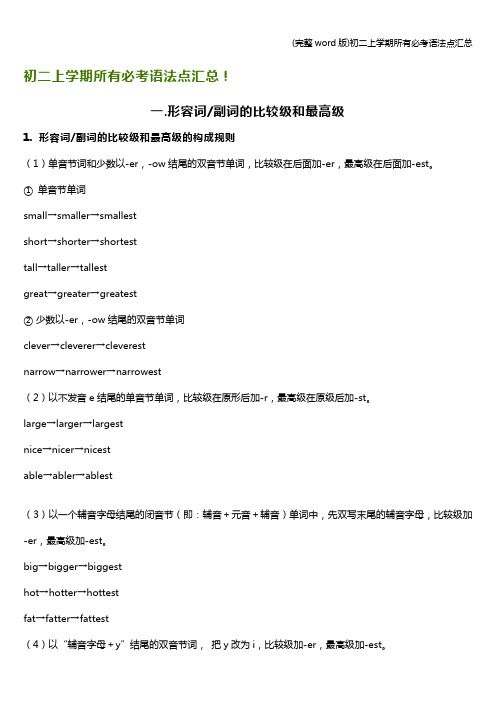
初二上学期所有必考语法点汇总!一.形容词/副词的比较级和最高级1. 形容词/副词的比较级和最高级的构成规则(1)单音节词和少数以-er,-ow结尾的双音节单词,比较级在后面加-er,最高级在后面加-est。
①单音节单词small→smaller→smallestshort→shorter→shortesttall→taller→tallestgreat→greater→greatest②少数以-er,-ow结尾的双音节单词clever→cleverer→cleverestnarrow→narrower→narrowest(2)以不发音e结尾的单音节单词,比较级在原形后加-r,最高级在原级后加-st。
large→larger→largestnice→nicer→nicestable→abler→ablest(3)以一个辅音字母结尾的闭音节(即:辅音+元音+辅音)单词中,先双写末尾的辅音字母,比较级加-er,最高级加-est。
big→bigger→biggesthot→hotter→hottestfat→fatter→fattest(4)以“辅音字母+y”结尾的双音节词,把y改为i,比较级加-er,最高级加-est。
easy→easier→easiestheavy→heavier→heaviestbusy→busier→busiesthappy→happier→happiest(5)其他双音节词和多音节词,比较级在前面加more,最高级在前面加most。
beautiful→more beautiful→most beautifuldifferent→more different→most differenteasily→more easily→most easily(6)有少数形容词、副词的比较级和最高级是不规则的,必须熟记。
good→better→bestwell→better→bestbad→worse→worstill→worse→worstold→older/elder→oldest/eldestmany/much→more→mostlittle→less→leastfar →further/farther→furthest/farthest2. 形容词和副词比较级的用法(1)“甲+be+(倍数)+形容词比较级+than+乙”表示“甲比乙…”或“甲比乙…几倍”。
2024年八年级上册英语知识点总结

start(同义词)begin
far(反义词)near
smoke(现在分词)smoking
careless(反义词)careful
important(比较级) more important
enjoy(现在分词)enjoying
9.invent(名词)invention; inventor
16. although = though虽然
17. most of the students=moststudents
18. shop=go shopping=do some shopping购物
19. as for至于
20. activity survey活动调查
21. do homework做家庭作业
as for...意思是“至于;关于”,常用于句首作状语,其后跟名词、代词或动词的`-ing形式(即动名词)。如:Asfor him,I never want to see him here.至于他,我永远不希望在这里见到。
As for the story,youd better not believe it.关于那故事,你最好不要相信。
30. come home from school放学回家
31. of course = certainly = sure当然
32. get good grades取得好成绩
33. someadvice
34. hardly=not nearly / almost not几乎不
35. keep/be in good health保持健康
Reading in bed is badfor your eyes.在床上读书对你的眼睛有害。
八年级上册英语重点语法归纳

八年级上册英语重点语法归纳一、一般过去时。
1. 概念:表示过去某个时间发生的动作或存在的状态。
2. 标志词:yesterday(昨天), last week(上周), last month(上个月), last year(去年), two days ago(两天前), in 1990(在 1990 年)等。
3. 构成:- 主语 + was / were + 其他(主语是第一人称 I 和第三人称单数用 was,其他人称用 were)- 主语 + 动词的过去式 + 其他。
4. 动词过去式的构成规则:- 一般在动词末尾加 -ed,如:play - played。
- 结尾是 e 的动词加 -d,如:like - liked。
- 重读闭音节词,双写末尾辅音字母再加 -ed,如:stop - stopped。
- 以辅音字母 + y 结尾的动词,变 y 为 i 再加 -ed,如:study - studied。
二、频度副词。
1. 常见的频度副词有:always(总是), usually(通常), often(经常), sometimes(有时), seldom(很少), never(从不)2. 频度副词在句中的位置:通常放在实义动词之前,be 动词、助动词或情态动词之后。
三、形容词和副词的比较级和最高级。
1. 比较级的构成规则:- 一般在词尾加 -er。
- 以不发音的 e 结尾的词加 -r。
- 重读闭音节词,双写末尾辅音字母再加 -er。
- 以“辅音字母 + y”结尾的词,变 y 为 i 再加 -er。
- 多音节词和部分双音节词在前面加 more。
2. 最高级的构成规则:- 一般在词尾加 -est。
- 以不发音的 e 结尾的词加 -st。
- 重读闭音节词,双写末尾辅音字母再加 -est。
- 以“辅音字母 + y”结尾的词,变 y 为 i 再加 -est。
- 多音节词和部分双音节词在前面加 most。
3. 比较级和最高级的用法:- 比较级用于两者之间的比较,常用 than 连接。
八年级上册英语知识点归纳

八年级上册英语知识点归纳八年级上册英语主要知识点归纳八年级上册英语教材内容丰富多样,涵盖了词汇、语法、阅读、写作等方面的知识点。
下面将按照教材的章节顺序,归纳总结八年级上册英语的主要知识点。
第一单元:动词的过去式和过去进行时本单元主要介绍了动词的过去式和过去进行时的构成和用法。
通过学习动词的过去式和过去进行时,学生能够更准确地表达过去发生的事情。
第二单元:一般过去时的肯定句、否定句和疑问句这一单元主要介绍了一般过去时的肯定句、否定句和疑问句的结构和用法。
学生通过学习一般过去时的用法,能够准确地描述过去的经历和事件。
第三单元:一般过去时的时间状语本单元主要介绍了一般过去时中常用的时间状语,如yesterday、last week等。
学生通过学习这些时间状语,能够更好地描述过去发生的事件。
第四单元:现在完成时这一单元主要介绍了现在完成时的构成和用法。
学生通过学习现在完成时,能够准确地表达已经发生或已经完成的动作。
第五单元:过去完成时本单元主要介绍了过去完成时的构成和用法。
学生通过学习过去完成时,能够准确地描述过去某个时间点之前发生的动作。
第六单元:动词不定式的用法这一单元主要介绍了动词不定式的用法。
学生通过学习动词不定式的用法,能够更好地理解和运用该结构。
第七单元:情态动词本单元主要介绍了can、could、may、might等情态动词的用法。
学生通过学习情态动词的用法,能够准确地表达能力、建议、允许等意义。
第八单元:被动语态这一单元主要介绍了被动语态的构成和用法。
学生通过学习被动语态,能够准确地表达被动的动作和状态。
第九单元:状语从句本单元主要介绍了状语从句的用法。
学生通过学习状语从句,能够更好地组织句子,表达原因、时间、条件等。
第十单元:宾语从句这一单元主要介绍了宾语从句的用法。
学生通过学习宾语从句,能够更准确地表达自己的观点和意见。
第十一单元:同位语从句本单元主要介绍了同位语从句的用法。
学生通过学习同位语从句,能够更准确地补充和解释名词或代词的意义。
八年级英语上册知识点总结(全)

八年级英语上册知识点总结人教新目标版Unit 1 How often do you exercise?一、词组go to the movies 去看电影look after=take care of 照顾surf the internet 上网healthy lifestyle 健康的生活方式go skate boarding 去划板keep healthy=stay healthy 保持健康eating habits 饮食习惯take more exercise 做更多的运动the same as 与什么相同once a month 一月一次be different from 不同twice a week 一周两次make a difference to 对什么有影响how often 多久一次although=though虽然as for 至于activity survey活动调查do homework做家庭作业do housework做家务事eat less meat 吃更少的肉junk food垃圾食物be good for 对什么有益be bad for对什么有害want to do sth 想做某事want sb to do sth想某人做某事try to do sth 尽量做某事come home from school放学回家of course=certainly=sure 当然get good grades 取得好成绩some advice 一些建议most of the students=most students 大多数学生shop=go shopping=do some shopping 购物exercise=take (much) exercise=do sports 锻炼help sb to do sth=help sb with sth 帮助某人做某事a lot of vegetables=many vegetables 许多蔬菜hardly=not nearly/almost not 几乎不keep/be in good health保持健康二、词汇精讲1、always、usually、often、sometimes、hardly ever和neveralways、usually、often、sometimes、hardly ever和never是英语中最常见的频度副词。
八年级上册英语总复习(知识点汇总)

八年级上册英语总复习(知识点汇总)
一、基本语法知识点
- 词汇:掌握八年级上册涉及的词汇,如名词、动词、形容词、副词等。
- 时态:熟悉一般现在时、一般过去时和一般将来时的构成和
用法。
- 句子结构:了解简单句、并列句和复合句的组成和使用方法。
- 语态:理解被动语态的构成和用法。
二、听力技巧
- 注意听力材料中的关键词,并对比选项进行判断。
- 注意听力材料中的语音语调,辨别重要信息。
- 注意时间、地点和人物等信息的提取。
三、阅读技巧
- 预览文章段落,了解大意及文章结构。
- 注意文章中的关键词,理解整个文章的主旨。
- 根据文章内容填写相关信息、选择正确答案或完成文章概述。
四、写作技巧
- 了解不同类型的写作任务,如叙述、说明、议论等。
- 练使用适当的词汇和句型表达自己的观点和想法。
- 注意书写格式、语法和拼写,提高写作质量。
五、语言知识
- 重点掌握八年级上册课本中的课文及相关练的语法、词汇和
常用句型。
- 针对容易出错的语言知识进行专项练,加深理解和记忆。
六、口语练
- 进行口语练,提高口语表达能力。
- 多参与英语口语交流,积累口语表达经验。
七、其他技巧
- 多听英语广播、看英文电影或电视剧,提高英语听力水平。
- 多做英语练题,培养解题技巧和思维能力。
以上为八年级上册英语总复习的知识点汇总,希望对你的学习有所帮助!。
八年级上册英语全部知识点

八年级上册英语全部知识点八年级英语是一个重要的阶段,这个阶段主要通过学习英语语法,掌握基础词汇和语言技能,提高对英语的理解能力和运用能力。
下面是八年级上册英语全部的知识点:语法1. 现在进行时:be+现在分词- 表示现在正在发生的动作- 常用时间状语:now, at the moment等2. 过去时:动词过去式- 表示过去发生的动作- 常用时间状语:yesterday, last week等3. 一般将来时:will+动词原形- 表示将要发生的动作- 常用时间状语:tomorrow, in the future等4. 情态动词- can/could, may/might, will/would, shall/should, must等- 表示能力、推测、意愿、命令、必须等情态5. 被动语态- be+过去分词- 表示动作的承受者是主语,强调动作的结果而非动作的执行者6. 宾语从句- 引导词包括that, if, whether, how等- 在句中作宾语7. 定语从句- 引导词包括that, which, whose, who等- 在句中修饰名词或代词词汇1. 常用动词- be, have, do, go, take, make, come等2. 易混淆词汇- good/well, bad/badly, usually/often等- 意义相近的单词3. 常用名词- person, place, thing, time等4. 常用形容词- big, small, tall, short, interesting, boring等5. 常用副词- slowly, fast, loudly, softly, well等语言技能1. 听力- 听懂基础日常英语对话和简单文章- 通过听写、跟读等训练来提高听力水平2. 口语- 练习日常英语对话,提高口语表达能力- 练习独白和演讲,提高流利度和语感3. 阅读- 阅读简单的英语文章,掌握基础单词和表达方式- 阅读英文小说和资料,提高阅读理解能力4. 写作- 练习书写英文单词和句子,提高写作质量- 练习写作各类文章,如日记、信件、作文等以上就是八年级上册英语全部知识点。
英语初二上语法知识点

英语初二上语法知识点摘要:一、前言二、英语初二上语法知识点概述1.名词2.冠词3.代词4.形容词5.副词6.动词7.时态8.被动语态9.非谓语动词三、具体知识点详解1.名词1.可数名词与不可数名词2.名词所有格2.冠词1.定冠词“the”2.不定冠词“a”和“an”3.代词1.人称代词2.物主代词3.指示代词4.疑问代词5.反身代词6.相互代词4.形容词1.形容词的比较级和最高级2.不规则形容词的比较级和最高级5.副词1.副词的比较级和最高级6.动词1.动词时态2.动词的被动语态7.时态1.一般现在时2.一般过去时3.一般将来时4.现在进行时5.过去进行时6.将来进行时7.现在完成时8.过去完成时9.将来完成时10.现在完成进行时11.过去完成进行时12.将来完成进行时8.被动语态1.一般现在时的被动语态2.一般过去时的被动语态3.一般将来时的被动语态4.现在进行时的被动语态5.过去进行时的被动语态6.将来进行时的被动语态7.现在完成时的被动语态8.过去完成时的被动语态9.将来完成时的被动语态10.现在完成进行时的被动语态11.过去完成进行时的被动语态12.将来完成进行时的被动语态9.非谓语动词1.动词不定式2.动词的-ing形式3.动词的过去分词形式四、总结正文:英语语法是英语学习的重要组成部分,特别是在初中阶段,语法知识的掌握程度直接影响到学生对英语句子的理解和运用。
初二上学期的语法知识点主要包括名词、冠词、代词、形容词、副词、动词、时态、被动语态和非谓语动词等。
下面将对这些知识点进行详细讲解。
一、名词名词是表示人、物、地点、抽象概念等名称的词。
在学习名词时,学生需要掌握可数名词与不可数名词的用法,以及名词所有格的表示方法。
二、冠词冠词是用于表示名词所指对象的一种虚词。
初二上学期的冠词主要包括定冠词“the”和不定冠词“a”和“an”。
学生需要了解它们在句子中的位置和用法。
三、代词代词是代替名词、数词、量词等词的词。
八年级上册英语语法归纳总结(通用11篇)

八年级上册英语语法归纳总结第1篇单音节形容词和部分双音节词大多是以y、ly、er结尾的双音节形容词,一般在词尾加-er。
以不发音字母e结尾的词,在词尾直接加-r。
重读闭音节词词尾只有一个辅音字母,元音发短音时,双写尾字母,再加er。
以“辅音字母+y”结尾的双音节词,变“y”为“i”,再加-er。
多音节词三音节及以上和部分双音节词,在词前加“more”。
部分形容词和副词的比较级是不规则的,如:good/well-better,bad/badly-worse。
由“动词+后缀-ing/-ed”构成的形容词,在词前加more构成比较级。
如:interesting-more interesting,bored-more bored。
由“形容词+后缀-ly”构成的副词,在该副词前加more构成比较级。
如:slowly-more slowly,happily- more happily。
八年级上册英语语法归纳总结第2篇He said I was hard-working.重点语法:宾语从句结构:主语 + 谓语动词 + 宾语从句(主语 + 谓语动词 + 宾语/表语)例句:----Im good at English. He says. (改为加宾语从句的复合句)----He says Im good at English.注意:①主句是一般现在时态,宾语从句的时态不受其影响。
例句:He says Im good at English now.He says I was good at mathematics when I was young.②主句是过去时态,宾语从句也要用过去时态。
例句:He said I was good at mathematics when I was young yesterday.He said I was good at English now yesterday.③宾语从句是客观真理时永远用一般现在时态。
八年级上册英语知识点汇总
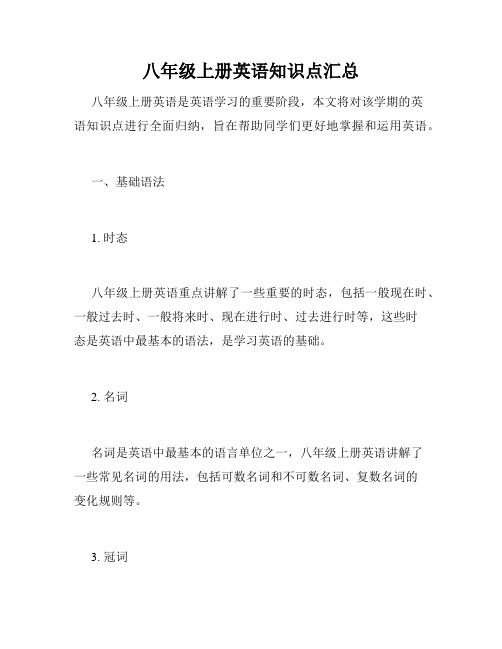
八年级上册英语知识点汇总八年级上册英语是英语学习的重要阶段,本文将对该学期的英语知识点进行全面归纳,旨在帮助同学们更好地掌握和运用英语。
一、基础语法1. 时态八年级上册英语重点讲解了一些重要的时态,包括一般现在时、一般过去时、一般将来时、现在进行时、过去进行时等,这些时态是英语中最基本的语法,是学习英语的基础。
2. 名词名词是英语中最基本的语言单位之一,八年级上册英语讲解了一些常见名词的用法,包括可数名词和不可数名词、复数名词的变化规则等。
3. 冠词英语中有两种冠词,分别是定冠词the和不定冠词a/an。
八年级上册英语重点讲解了这两种冠词的用法,帮助同学们更好地理解和运用英语。
4. 代词代词是指代名词的一种词语,八年级上册英语讲解了一些常见代词的用法,包括人称代词、物主代词、反身代词等。
二、词汇和语法运用1. 常见单词八年级上册英语中出现了很多常见单词,如动词、形容词、副词、介词等,例如:read、write、happy、angry、fast、slow、in、on等,同学们需要熟练掌握这些单词的用法。
2. 词组和句型英语中有很多常用的词组和句型,八年级上册英语涵盖了很多常用的词组和句型,例如:at school、go to school、have a good time、take care等,学生们需要掌握这些常用的词组和句型的用法和搭配方式。
3. 阅读理解八年级上册英语的阅读理解涵盖了各种各样的主题和场景,例如:旅游、生活、家庭等,同学们需要仔细阅读文章,理解其中的含义和主旨,并能够应用所学的语言知识进行表述和交流。
三、听力和口语练习1. 听力练习八年级上册英语的听力练习涵盖了各种各样的主题和场景,例如:购物、旅游、家庭等,同学们需要认真听取录音内容,理解其中的含义和主旨,并能够准确地回答问题。
2. 口语练习八年级上册英语的口语练习包括了各种各样的主题和场景,例如:介绍自己、谈论兴趣爱好、描述场景等,同学们需要通过模拟情景对话进行口语练习,提高自己的口语表达水平。
英语八年级上册重点知识归纳

英语八年级上册重点知识归纳
摘要:
一、英语八年级上册的重点知识归纳
1.语法:名词、冠词、代词、数词、介词、连词、形容词、副词、动词、句子结构
2.词汇:常用词汇、核心词汇、词汇搭配
3.阅读理解:技巧与实践
4.写作:写作技巧与实践
正文:
英语八年级上册的重点知识归纳主要包括以下几个方面:
一、语法
1.名词:名词的分类、名词的数、名词的所有格
2.冠词:不定冠词、定冠词的用法
3.代词:人称代词、物主代词、指示代词、疑问代词、反身代词、相互代词的用法
4.数词:基数词、序数词的用法
5.介词:介词的分类和常用介词的用法
6.连词:并列连词、从属连词的用法
7.形容词:形容词的分类、形容词的顺序、比较级和最高级的构成和用法
8.副词:副词的分类、副词的位置、比较级和最高级的构成和用法
9.动词:动词的分类、时态、语态、情态动词的用法
10.句子结构:简单句、复合句的构成和用法
二、词汇
1.常用词汇:根据教材内容,整理出常用词汇,方便学生记忆和应用
2.核心词汇:根据课程标准和考试要求,筛选出核心词汇,要求学生熟练掌握
3.词汇搭配:整理出常用的词汇搭配,帮助学生更好地理解和使用英语
三、阅读理解
1.技巧:提供阅读理解的方法和技巧,如快速浏览、寻找关键词等
2.实践:通过阅读理解练习题,让学生在实际操作中掌握阅读理解的技巧
四、写作
1.写作技巧:教授英语写作的基本技巧,如如何开头结尾、如何组织段落、如何使用连接词等
2.实践:通过写作练习,让学生在实际操作中掌握写作技巧,提高写作水平。
八年级上学期英语所有必考知识点大汇总

新人教版|八年级上学期英语所有必考知识点大汇总,掌握住,期末考稳拿高分!1 ?【重点语法】不定代词:不指名代替任何特定名词或形容词的代词叫做不定代词。
用法注意:1. 和 +可数名/不可数名。
多用于肯定句,多用于否认句、疑问句和条件从句。
有些问句中用,不用, 问话者希望得到对方肯定答复。
2. 由, , , 与 , , 构成的复合不定代词作主语时,其谓语动词用三单。
3. 不定代词假设有定语修饰,该定语要置于其后:如:【重点短语】1. . 为某人买某物2. + . 尝起来……3. + V.(原形) 除了……之外什么都没有4. + ( ) + 看起来5. + 大地方 / + 小地方到达某地6. . 决定做某事7. . 尝试做某事 / . 尽力做某事8. . 喜欢做某事9. . 想去做某事10. . 开场做某事 .11. . 停顿做某事区分: . 停下来去做某事12. . 不喜欢做某事14. + + + 从句如此……以至于……16. . () . 告诉某人〔不要〕做某事17. . 继续做某事18. . 忘记去做某事 / 忘记做过某事【词语辨析】1. a 拍照a 名词复数“许多…〞2. + 形容词看起来…... .+ . 似乎/好似做某事 I a+ 从句似乎..…. .... 好似,似乎….. a .3. +大地点= 地点名“到达......〞+小地点〔注:假设后跟地点副词, 介词需省略,如: ; 〕4. 感觉像…. 想要做某事5. 〔想知道〕+疑问词〔, , )引导的从句。
6. +名/代从句’t a .I ’t .7. +名词足够的…...形容词/副词2 ?【重点语法】1. 频率副词: , , , ,频率副词在句中通常放在实义动词之前, 动词或助动词之后。
常用于一般现在时态中。
2.“次数〞的表达方法一次,两次,三次或三次以上:基数词+ , 如: , ,3. “多久一次〞问频率,答复常含有频率词组或短语。
常见的疑问词:1〕多久〔以后〕— ?他多久能回来?— a . 他一个月后能回来。
八年级上册英语重点知识点总结

八年级上册英语重点知识点总结这篇文章给大家分享八年级上册重要的英语知识点,包括不定代词、副词以及比较级和最高级的用法等。
比较级和最高级用法形容词和副词比较级的用法(1)“A+be+(倍数)+形容词比较级+than+B”表示“A比B…”或“A比B…几倍”。
(2)“A+实意动词+(倍数)+副词比较级+than+B”表示“A比B…”或“A比B…几倍”。
形容词和副词最高级的用法(1)“主语+be+the+形容词最高级(+单数名词)+in/of...”表示“……是……中最……的”。
(2)“主语+实意动词+(the)+副词最高级+in/of...”表示“……是……中最……的”。
不定代词和不定副词的用法1.左边的some、any、every、no与右边的body、one、thing 构成不定代词,some、any、every、no与右边的疑问副词where构成不定副词;2.一般情况下以some开头的不定代词和不定副词用于肯定句,以any开头的不定代词和不定副词用于否定句、疑问句;以no开头的不定代词和不定副词表示否定含义(no one为两个单词);3.不定代词或不定副词和形容词连用时,形容词放在后面。
He has something important to do.他有重要的事情要做。
(肯定句用something,形容词important放后)Did you buy anything special? (一般疑问句用anything,形容词special放后)情态动词can(能,会),may(可以,可能,也许),must(必须,一定,应该)have to(必须,不得不)1.肯定句结构:主语+can/may/must+动词原形+其它,例如:I must go now.2.否定句结构:在can/may/must后加not,例如:You mustn’t talk aloud in the library.3.一般疑问句结构:把can/may/must提在主语前,例如:Must you go now?(Yes,I must. No,I needn’t.)May I open the window?(Yes,you may. No,you needn’t.)一般疑问句一、不用疑问词,但需要用yes或no回答的疑问句,叫一般疑问句。
- 1、下载文档前请自行甄别文档内容的完整性,平台不提供额外的编辑、内容补充、找答案等附加服务。
- 2、"仅部分预览"的文档,不可在线预览部分如存在完整性等问题,可反馈申请退款(可完整预览的文档不适用该条件!)。
- 3、如文档侵犯您的权益,请联系客服反馈,我们会尽快为您处理(人工客服工作时间:9:00-18:30)。
初二上学期英语知识点汇总集团文件发布号:(9816-UATWW-MWUB-WUNN-INNUL-DQQTY-一. 形容词/副词的比较级和最高级1. 形容词/副词的比较级和最高级的构成规则(1)单音节词和少数以-er,-ow结尾的双音节单词,比较级在后面加-er,最高级在后面加-est。
①单音节单词small→smaller→smallestshort→shorter→shortest?tall→taller→tallestgreat→greater→greatest②?少数以-er,-ow结尾的双音节单词clever→cleverer→cleverest?narrow→narrower→narrowest?(2)以不发音e结尾的单音节单词,比较级在原形后加-r,最高级在原级后加-st。
large→larger→largestnice→nicer→nicestable→abler→ablest(3)以一个辅音字母结尾的闭音节(即:辅音+元音+辅音)单词中,先双写末尾的辅音字母,比较级加-er,最高级加-est。
big→bigger→biggesthot→hotter→hottestfat→fatter→fattest(4)以“辅音字母+y”结尾的双音节词,把y改为i,比较级加-er,最高级加-est。
easy→easier→easiestheavy→heavier→heaviest?busy→busier→busiesthappy→happier→happiest(5)其他双音节词和多音节词,比较级在前面加more,最高级在前面加most。
beautiful→more beautiful→most beautifuldifferent→more different→most different?easily→more easily→most easily(6)有少数形容词、副词的比较级和最高级是不规则的,必须熟记。
good→better→bestwell→better→bestbad→worse→worstill→worse→worstold→older/elder→oldest/eldest?many/much→more→mostlittle→less→least?far →further/farther→ furthest/farthest2. 形容词和副词比较级的用法(1)“甲+be+(倍数)+形容词比较级+than+乙”表示“甲比乙…”或“甲比乙…几倍”。
Tom is taller than Kate.汤姆比凯特高。
This room is three times bigger than that one.这个房间比那个大三倍。
(2)“甲+实意动词+(倍数)+副词比较级+than+乙”表示“甲比乙…”或“甲比乙…几倍”。
I got up earlier than my mother this morning.我今天早晨起床比我妈妈还早。
He runs three times faster than his brother.他跑的速度比他弟弟快三倍。
3. 形容词和副词最高级的用法(1)“主语+be+the+形容词最高级(+单数名词)+in/of...”表示“……是……中最……的”。
Tom is the tallest in his class./of all the students.汤姆是他们班上/所有学生当中最高的。
This apple is the biggest of the five.这个苹果是五个当中最大的。
(2)“主语+实意动词+(the)+副词最高级+in/of...”表示“……是……中最……的”。
I jump (the) farthest in my class.我是我们班跳得最远的。
二. 句子成分1.主语:句子所陈述的对象。
2.谓语:主语发出的动作。
一般是有动作意义的动词。
3. 宾语:分为动词宾语和介词宾语,属于动作的承受者。
4. 系动词:表示状态或状态变化的动词,没有实际的动作意义。
如 be, 感官系动词(look, sound, smell, taste 和 feel)、保持类系动词(keep, stay 和 remain)、状态变化类系动词(become、get、turn 和 go)等。
5. 表语:紧跟系动词后面的成分。
6. 定语:修饰名词或代词的成分。
7. 状语:修饰形容词、副词、动词或句子的成分。
8. 补语:分为宾语补足语和主语补足语。
是对宾语和主语的补充说明,与其有主动或被动的逻辑关系。
例如:You should keep the room clean and tidy.你应该让屋子保持干净整洁。
(You是主语, should keep是谓语,the room是宾语,clean andtidy是宾语补足语。
)This kind of food tastes delicious.这种食物吃起来很可口。
(This kind of food是主语, tastes是系动词, delicious是表语。
)注意:主语、谓语、宾语、系动词、表语、补语是一个句子的主干成分;定语和状语是一个句子的修饰性成分,不是主干成分。
三. 句子类型1. 简单句的基本形式是由一个主语加一个谓语构成。
2. 复合句由一个主句和一个或一个以上的从句构成。
3.两个或两个以上的简单句用并列连词连在一起构成的句子,叫做并列句,其基本结构是“简单句+并列连词+简单句”。
四. 简单句的五种基本句型1.“主语 + 谓语”(即“主谓”句型)例:They arrived in Harbin yesterday morning.分析:“they”(主语)“arrived”(谓语)。
2.“主语 + 谓语 + 宾语”(即“主谓宾”句型)例:I study English.分析:“I”(主语)“study”(谓语动作)“English”(宾语即动作涉及的对象)。
3.“主语 + 谓语 + 间接宾语 + 直接宾语”(即“主谓双宾”句型)例:Our teacher taught us English.分析:“our teacher”(主语)“教”(谓语动作)“us”(间接宾语)“English”(直接宾语)。
4.“主语 + 谓语 + 宾语 + 宾语补足语”(即“主谓宾宾补”句型)例: He asked her to go there.分析:“he”(主语)“asked”(谓语动作)“her”(宾语即动作涉及的对象)“to go there”(补语—补充说明宾语做什么)。
5.“主语 + 系动词+ 表语”(即“主系表”句型)常用的系动词有be, keep,lie, remain, stand, become, fall, get, go, grow, turn, look, feel, seem, smell, sound, taste, 等。
例: I am a teacher. 我是一名老师分析:“I”(主语)“am”(系动词)“a teacher”(表语—即表明主语的身份)。
五. 宾语从句1. 宾语从句的含义在主句中做宾语的从句叫做宾语从句。
如:She knew?that the teacher had seen the film.她知道这位老师看过这部电影。
“that the teacher had seen the film”做 knew 的宾语,同时又是由连接词 that 引导的从句,所以它叫做宾语从句。
2. 宾语从句的分类(1)动词宾语从句:顾名思义,它是位于动词后面的宾语从句。
如:He asked?whose handwriting was the best in our class.他问我们班上谁的书法最好。
(2)介词宾语从句:顾名思义,它是位于介词后面的宾语从句。
如:I agree with?what you said just now.我同意你刚才说的话。
(3)形容词宾语从句:顾名思义,它是位于形容词后面的宾语从句。
如:I am afraidthat I will be late.恐怕我要迟到了。
3. 引导名词性从句的连接词(1)that:没有含义,在宾语从句中不做成分(2)whether/if:表示是否,在宾语从句中不做成分。
I don't know?if /whether he still lives here after so many years. 我不知道这么多年后,他是否还住在这里。
(3)连接代词:what, which, who, whom, whose(在宾语从句中做主、宾、表和定语)连接副词:where, when, how, why(在宾语从句中做状语)The small children don't know?what is in their stockings.(what 在宾语从句中做主语)这些小孩子不知道什么在他们的长筒袜里。
Could you tell mewhy you were late for the meeting this morning (why 在宾语从句中做原因状语)你能告诉我为什么你今天早上开会迟到吗?4. 在做宾语从句的题目时应注意两点(1)时态:①当主句是现在时态时,宾语从句可以根据需要使用任何时态。
I don't know when he will come back.我不知道他将何时回来。
He tells me that his sister came back yesterday.他告诉我他姐姐昨天回来了。
②当主句是过去时态时,宾语从句必须是一种过去的时态。
She asked me if I knew whose pen it was.她问我是否知道这是谁的钢笔。
七.现在进行时现在进行时表示此时此刻正在发生的事情。
常与now,at the moment,look,listen等词连用。
The little boy is watching TV now.这个小男孩现在正在看电视。
Listen!She is playing the guitar in the next room.听!她正在隔壁房间弹吉他。
现在进行时的基本结构:肯定式:am/is/are+doing(现在分词)否定式:am/is/are not +doing(现在分词)一般疑问式:Am/Is/Are + 主语 +doing(现在分词)+ 其他特殊疑问式:特殊疑问词+一般疑问式They’re having a meeting now.他们现在正在开会。
They aren't having a meeting now.他们现在没有在开会。
